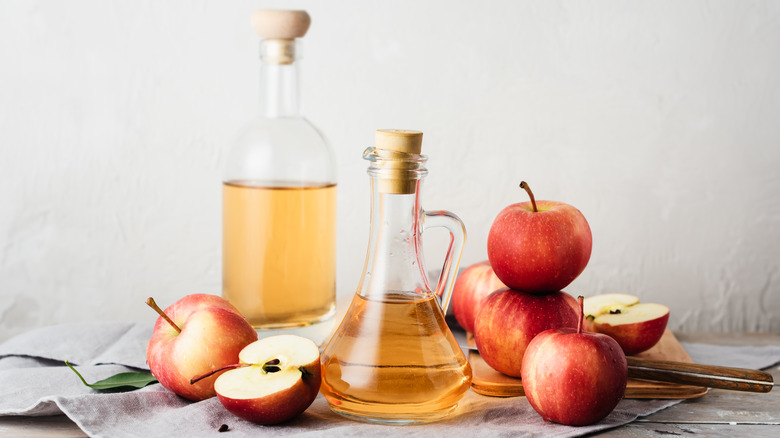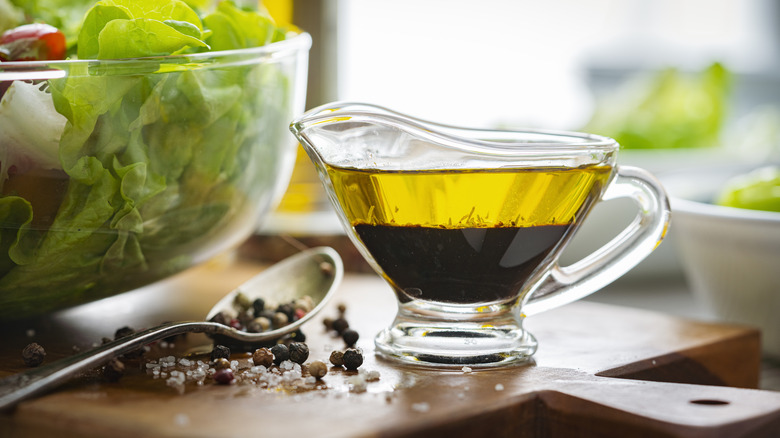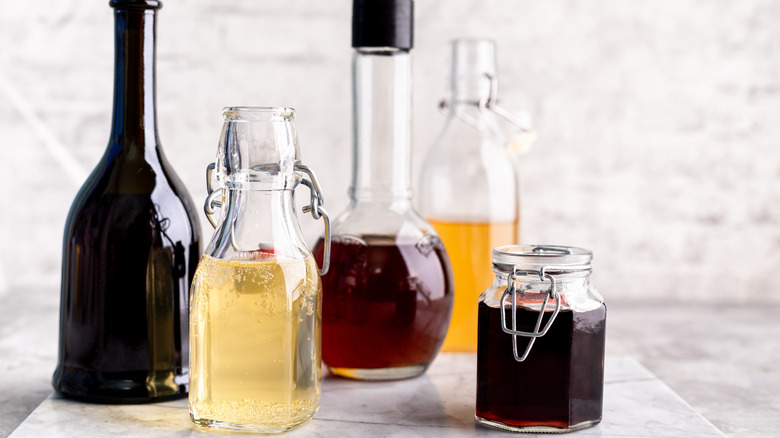To Make Sure Vinegar Packs Its Punch For Longer, Buy Smaller Bottles
If you've ever had a tangy salad dressing or some pickled red onions, you've probably noticed that distinct, subtle pungency that comes with each bite. And if you love this little zing, then you have vinegar to thank. In its simplest form, this sharp-tasting liquid is just acetic acid coupled with water. There are plenty of different types of vinegar, all prepared a bit differently, but we use them all for a similar reason: to add an acidic flavor that's hard to find elsewhere. But did you know that every time you open that jar of vinegar, it dies a little inside? Well, its flavor does, at least.
When vinegar is exposed to air, it can lose its acidity because moisture from the air can get into the vinegar and alter its pH level. For this reason, it's best to avoid those big vinegar bottles and instead buy the smallest ones possible; you'll expose the vinegar to less air when it's used quickly. While twisting the cap off for a little vinegar won't ruin it completely, when you do this repeatedly, it can impact that acidic flavor.
Vinegar can lose its flavor and acidity -- but it won't expire
Since this ingredient is so pungent, it's typically used in small quantities. Purchasing a one-gallon jug when you only use one tablespoon per recipe means it could take years before that bottle is gone. And since all vinegar is a blend of acetic acid and water, it doesn't matter what kind you're using; the rule still applies. But don't worry — your vinegar will never actually expire.
Vinegar contains so much acid that you never have to worry about it actually going bad. It might lose some of its pungency over the years, but you won't get sick from it. Buying smaller bottles is just one way to make sure the vinegar stays at its best for as long as possible. Make sure to only leave the vinegar bottle open when you're pouring it; otherwise, keep the cap on at all times. And it's best to store it in a cool, dark place, such as your pantry. There's no need to refrigerate it.
What gives vinegar its acidity?
There are very few ingredients that don't have an expiration date. So, what puts vinegar in this category? The acidity, yes, but that acidity comes from somewhere else. Fruits and grains produce sugars in the form of liquid or juice; vinegar is made when yeast consume that juice, which ferments to become alcohol. Once that alcohol is exposed to air, bacteria start to grow. These bacteria are known as acetic acid bacteria, and as they ferment, the mixture becomes vinegar. Some vinegars ferment for months while others can sit for decades.
Water is added to reduce the acidity of the vinegar (it would not be fun to eat or drink straight acid). And that brings us back to square one: water's impact on vinegar. Moisture from the air seeps into vinegar every time it's opened, so buying smaller bottles keeps those acidity levels high. Since water itself has a neutral pH, it will never fully neutralize that vinegar, which helps explain why vinegar never expires.


